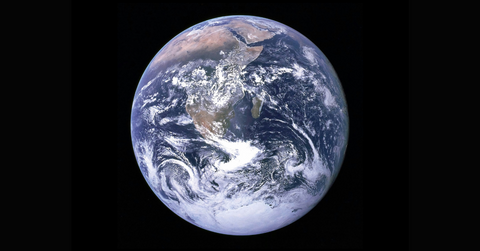Experts Predict the Earth Will Eventually Run Out of Oxygen
Researchers say that there is an expiration date on our planet.
Published May 7 2025, 12:05 p.m. ET

While many people like to speculate about how human life on Earth will eventually come to an end — popular theories include nuclear war, climate change, and even an asteroid like the one scientists believe took out the dinosaurs — researchers at one university believe they've cracked the code. According to them, the event that eventually causes Earth to cease to exist as we know it will come about slowly, and it will spell the end for almost all living things on this planet.
That's because they predict that the oxygen in the Earth's atmosphere will eventually decline to such a degree that the planet will no longer be able to sustain life.
But, the good news is that it's not something that we need to worry about anytime soon. Continue reading to learn more about what researchers have to say.

The oxygen in Earth's atmosphere will eventually decline.
Researchers with Japan's Toho University have used modeling information from NASA to come up with their theory of how life will end on our planet. According to El Adelantado, the group combined information provided by NASA as well as atmospheric and planetary simulations to see how the Earth 's climate would evolve over the years.
Unfortunately, their modeling all indicates that the increased heat coming off of the sun will eventually disrupt the Earth's gases.
This will become significant enough to throw off the planet's carbon cycle, which is what helps plants photosynthesize, decreasing the amount of plant life found on the planet. As such, there will be less oxygen produced, which will again further limit plant growth. The vicious cycle is expected to play out slowly, until ultimately the only creatures left on the planet are those microbes and bacteria that don't need oxygen to survive.
When will Earth run out of oxygen?
There's good news to go along with this theory. Even if the researchers are correct, and Earth eventually runs out of oxygen, we won't be around to see it.
Neither will our children, or their children, or their children's children's children. That's because this process is expected to take something like a billion years to complete.

And when you consider the fact that almost all experts agree that the sun is going to turn into a red giant in approximately four billion years from now, it could be good news that there won't be any humans left on the planet to have to worry about how to survive.
That being said, it's worth noting that this type of science can only estimate timelines and outcomes. As technology changes, so can theories about what will happen next.
Similarly, the choices that humankind makes now can also influence things. Climate change and nuclear war are still very plausible guesses when it comes to the planet's demise. Positive changes now can lessen those impacts, and maybe even take them out of the equation. Meanwhile, negative changes could increase the odds that we won't ever get a chance to worry about the end of Earth's oxygen production.
The important thing is to focus on the things that we have control over, and that we can change now, instead of getting caught up in the what-if's from a billion years from now.